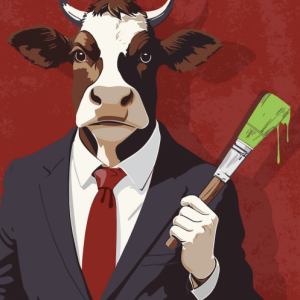
This report by Changing Markets provides an in-depth investigation into the tactics of meat and dairy companies to delay, distract and derail action on food system transformation, particularly reducing meat and dairy consumption. It argues that it mirrors the strategies used by tobacco and fossil fuel industries.
Publisher's executive summary
This report reveals the tactics of Big Meat and Dairy companies to delay, distract, and derail action on transforming the food system, mirroring strategies used by the tobacco and fossil fuel industries. Food systems are responsible for around a third of global greenhouse gas emissions, with approximately 60% coming from animal agriculture, the largest source of man-made methane emissions.
The Urgency of Reducing Methane Emissions
The science is clear: we cannot meet the Paris Agreement’s 1.5-degree temperature increase target without significantly cutting methane emissions and reducing animal product consumption. The agricultural sector is a major climate change contributor through methane and nitrous oxide pollution and deforestation. Over 200 climate scientists believe livestock emissions must peak by 2025 in high- and middle-income countries and cut globally by 50% by 2030.
Agricultural Exceptionalism and Influence
Despite their huge negative impact on climate, biodiversity and human health, big meat and dairy corporations have largely been off the hook, regarding environmental regulation. Our investigation reveals that the industry has largely succeeded in convincing policymakers of agricultural exceptionalism, getting several concessions, exemptions and delays to climate action in the sector.
In several countries, the industry managed to convince policymakers to adopt all-carrots-and-no-sticks approaches to regulating agricultural emissions, which means that any change in farming practices is voluntary and depends on additional financial incentives, while significant public subsidies that the sector already receives remains off limits for any reforms. Unfortunately, current agricultural subsidies largely support the existing status quo of big farms, benefiting large companies in the middle of the chain (so-called Big Ag) and putting small family farms out of business.
To better understand Big Ag’s influence, we analysed actions by 22 of the biggest meat and dairy companies across four continents, looking at their voluntary climate commitments, greenwashing claims, investments in advertising versus low-carbon solutions and their political engagement, which included political donations, meetings with politicians, money spent on lobbying, as well as what narratives they are pushing either directly or indirectly through the work of industry associations.
We looked at how the industry is co-opting science by funding its own research to downplay the sector’s impact on climate and promoting its preferred solutions, mostly in the form of voluntary technological fixes. The report provides a detailed analysis of different corporate narratives to consumers, media, and policymakers, showing how the industry distracts us with the smokescreen of voluntary climate targets, environmentally friendly products, and seemingly ambitious investments in emissions reduction technologies, while behind the scenes, it mobilises significant resources to delay and derail progressive environmental legislation.
Delay, distract and derail tactics
Our investigation broadly divided the corporate playbook of Big Meat and Dairy into three key tactics: distract, delay and derail. This builds on our previous research into the corporate playbook of Big Plastic, which we published in the landmark report Talking Trash, which launched in 2020. Some companies and industry associations overlap, but the tactics that play out in each sector are different. We found strong correlations with the tactics of climate denial by Big Oil, which are referred to throughout the report.







Post a new comment »